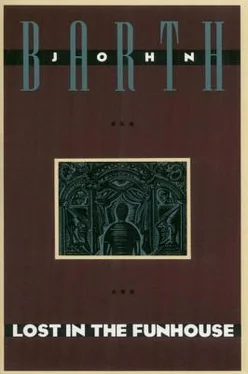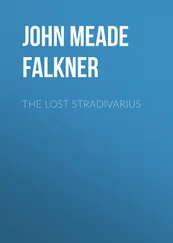John Barth - Lost in the Funhouse
Здесь есть возможность читать онлайн «John Barth - Lost in the Funhouse» весь текст электронной книги совершенно бесплатно (целиком полную версию без сокращений). В некоторых случаях можно слушать аудио, скачать через торрент в формате fb2 и присутствует краткое содержание. Год выпуска: 2014, ISBN: 2014, Издательство: Knopf Doubleday Publishing Group, Жанр: Современная проза, на английском языке. Описание произведения, (предисловие) а так же отзывы посетителей доступны на портале библиотеки ЛибКат.
- Название:Lost in the Funhouse
- Автор:
- Издательство:Knopf Doubleday Publishing Group
- Жанр:
- Год:2014
- ISBN:978-0-8041-5250-1
- Рейтинг книги:3 / 5. Голосов: 1
-
Избранное:Добавить в избранное
- Отзывы:
-
Ваша оценка:
- 60
- 1
- 2
- 3
- 4
- 5
Lost in the Funhouse: краткое содержание, описание и аннотация
Предлагаем к чтению аннотацию, описание, краткое содержание или предисловие (зависит от того, что написал сам автор книги «Lost in the Funhouse»). Если вы не нашли необходимую информацию о книге — напишите в комментариях, мы постараемся отыскать её.
Lost in the Funhouse — читать онлайн бесплатно полную книгу (весь текст) целиком
Ниже представлен текст книги, разбитый по страницам. Система сохранения места последней прочитанной страницы, позволяет с удобством читать онлайн бесплатно книгу «Lost in the Funhouse», без необходимости каждый раз заново искать на чём Вы остановились. Поставьте закладку, и сможете в любой момент перейти на страницу, на которой закончили чтение.
Интервал:
Закладка:
I think she comes. The story of our life. This is the final test. Try to fill the blank. Only hope is to fill the blank. Efface what can’t be faced or else fill the blank. With words or more words, otherwise I’ll fill in the blank with this noun here in my prepositional object. Yes, she already said that. And I think. What now. Everything’s been said already, over and over; I’m as sick of this as you are; there’s nothing to say. Say nothing.
What’s new? Nothing.
Conventional startling opener. Sorry if I’m interrupting the Progress of Literature, she said, in a tone that adjective clause suggesting good-humored irony but in fact defensively and imperfectly masking a taunt. The conflict is established though as yet unclear in detail. Standard conflict. Let’s skip particulars. What do you want from me? What’ll the story be this time? Same old story. Just thought I’d see if you were still around. Before. What? Quit right here. Too late. Can’t we start over? What’s past is past. On the contrary, what’s forever past is eternally present. The future? Blank. All this is just fill in. Hang on.
Still around. In what sense? Among the gerundive. What is that supposed to mean? Did you think I meant to fill in the blank? Why should I? On the other hand, why not? What makes you think I wouldn’t fill in the blank instead? Some conversation this is. Do you want to go on, or shall we end it right now? Suspense. I don’t care for this either. It’ll be over soon enough in any case. But it gets worse and worse. Whatever happens, the ending will be deadly. At least let’s have just one real conversation. Dialogue or monologue? What has it been from the first? Don’t ask me. What is there to say at this late date? Let me think; I’m trying to think. Same old story. Or. Or? Silence.
This isn’t so bad. Silence. There are worse things. Name three. This, that, the other. Some choices. Who said there was a choice?
Let’s try again. That’s what I’ve been doing; I’ve been thinking while you’ve been blank. Story of Our Life. However, this may be the final complication. The ending may be violent. That’s been said before. Who cares? Let the end be blank; anything’s better than this.
It didn’t used to be so bad. It used to be less difficult. Even enjoyable. For whom? Both of us. To do what? Complicate the conflict. I am weary of this. What, then? To complete this sentence, if I may bring up a sore subject. That never used to be a problem. Now it’s impossible; we just can’t manage it. You can’t fill in the blank; I can’t fill in the blank. Or won’t. Is this what we’re going to talk about, our obscene verbal problem? It’ll be our last conversation. Why talk at all? Are you paying attention? I dare you to quit now! Never dare a desperate person. On with it, calmly, one sentence after another, like a recidivist. A what? A common noun. Or another common noun. Hold tight. Or a chronic forger, let’s say; committed to the pen for life. Which is to say, death. The point, for pity’s sake! Not yet. Forge on.
We’re more than halfway through, as I remarked at the outset: youthful vigor, innocent exposition, positive rising action — all that is behind us. How sophisticated we are today. I’ll ignore her, he vowed, and went on. In this dehuman, exhausted, ultimate adjective hour, when every humane value has become untenable, and not only love, decency, and beauty but even compassion and intelligibility are no more than one or two subjective complements to complete the sentence.…
This is a story? It’s a story, he replied equably, or will be if the author can finish it. Without interruption I suppose you mean? she broke in. I can’t finish anything; that is my final word. Yet it’s these interruptions that make it a story. Escalate the conflict further. Please let me start over.
Once upon a time you were satisfied with incidental felicities and niceties of technique: the unexpected image, the refreshingly accurate word-choice, the memorable simile that yields deeper and subtler significances upon reflection, like a memorable simile. Somebody please stop me. Or arresting dialogue, so to speak. For example?
Why do you suppose it is, she asked, long participial phrase of the breathless variety characteristic of dialogue attributions in nineteenth-century fiction, that literate people such as we talk like characters in a story? Even supplying the dialoguetags, she added with wry disgust. Don’t put words in her mouth. The same old story, an old-fashioned one at that. Even if I should fill in the blank with my idle pen? Nothing new about that, to make a fact out of a figure. At least it’s good for something. Every story is penned in red ink, to make a figure out of a fact. This whole idea is insane.
And might therefore be got away with.
No turning back now, we’ve gone too far. Everything’s finished. Name eight. Story, novel, literature, art, humanism, humanity, the self itself. Wait: the story’s not finished. And you and I, Howard? whispered Martha, her sarcasm belied by a hesitant alarm in her glance, flickering as it were despite herself to the blank instrument in his hand. Belied indeed; put that thing away! And what does flickering modify? A person who can’t verb adverb ought at least to speak correctly.
A tense moment in the evolution of the story. Do you know, declared the narrator, one has no idea, especially nowadays, how close the end may be, nor will one necessarily be aware of it when it occurs. Who can say how near this universe has come to mere cessation? Or take two people, in a story of the sort it once was possible to tell. Love affairs, literary genres, third item in exemplary series, fourth — everything blossoms and decays, does it not, from the primitive and classical through the mannered and baroque to the abstract, stylized, dehumanized, unintelligible, blank. And you and I, Rosemary? Edward. Snapped! Patience. The narrator gathers that his audience no longer cherishes him. And conversely. But little does he know of the common noun concealed for months in her you name it, under her eyelet chemise. This is a slip. The point is the same. And she fetches it out nightly as I dream, I think. That’s no slip. And she regards it and sighs, a quantum grimlier each night it may be. Is this supposed to be amusing? The world might end before this sentence, or merely someone’s life. And/or someone else’s. I speak metaphorically. Is the sentence ended? Very nearly. No telling how long a sentence will be until one reaches the stop It sounds as if somebody intends to fill in the blank. What is all this nonsense about?
It may not be nonsense. Anyhow it will presently be over. As the narrator was saying, things have been kaput for some time, and while we may be pardoned our great reluctance to acknowledge it, the fact is that the bloody century for example is nearing the three-quarter mark, and the characters in this little tale, for example, are similarly past their prime, as is the drama. About played out. Then God damn it let’s ring the curtain. Wait wait. We’re left with the following three possibilities, at least in theory. Horseshit. Hold onto yourself, it’s too soon to fill in the blank. I hope this will be a short story.
Shorter than it seems. It seems endless. Be thankful it’s not a novel. The novel is predicate adjective, as is the innocent anecdote of bygone days when life made a degree of sense and subject joined to complement by copula. No longer are these things the case, as you have doubtless remarked. There was I believe some mention of possibilities, three in number. The first is rejuvenation: having become an exhausted parody of itself, perhaps a form — Of what? Of anything — may rise neoprimitively from its own ashes. A tiresome prospect. The second, more appealing I’m sure but scarcely likely at this advanced date, is that moribund what-have-yous will be supplanted by vigorous new: the demise of the novel and short story, he went on to declare, needn’t be the end of narrative art, nor need the dissolution of a used-up blank fill in the blank. The end of one road might be the beginning of another. Much good that’ll do me. And you may not find the revolution as bloodless as you think, either. Shall we try it? Never dare a person who is fed up to the ears.
Читать дальшеИнтервал:
Закладка:
Похожие книги на «Lost in the Funhouse»
Представляем Вашему вниманию похожие книги на «Lost in the Funhouse» списком для выбора. Мы отобрали схожую по названию и смыслу литературу в надежде предоставить читателям больше вариантов отыскать новые, интересные, ещё непрочитанные произведения.
Обсуждение, отзывы о книге «Lost in the Funhouse» и просто собственные мнения читателей. Оставьте ваши комментарии, напишите, что Вы думаете о произведении, его смысле или главных героях. Укажите что конкретно понравилось, а что нет, и почему Вы так считаете.












